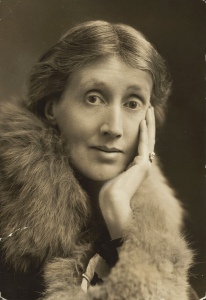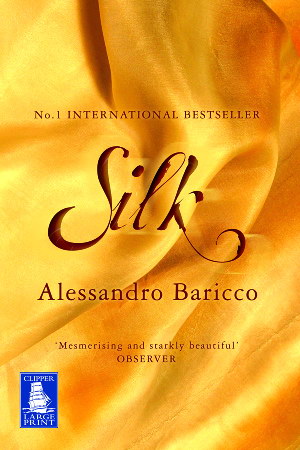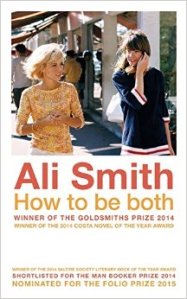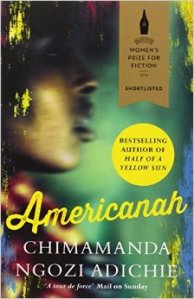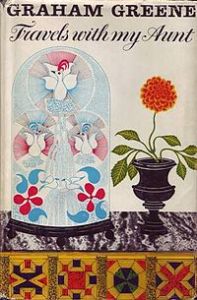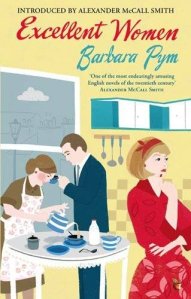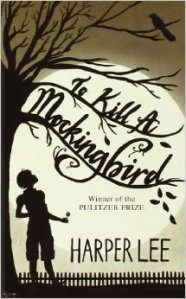Again, a very interesting discussion, sharing serious thoughts and laughter and strong opinions about those two short-stories.
Those of you present will find below the notes you asked for : i.e name of W. Mitty’s illness and F O’Connor’s own opinion of her story.A bit long, I warn you.
I hope it will interest also some who were absent.

1. Overcompensation Adler or maladaptive day-dreaming or SCT ( sluggish cognitive tempo).
drawing by Henry Chamberlain
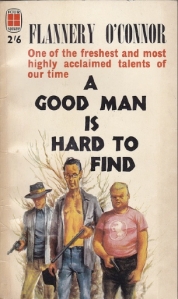 2[O’Connor delivered the following remarks at areading she gave at Hollins College, Virginia on14 October 1963. In introducing her “A Good Man Is Hard to Find,” O’Connor touches upon the function of violence and the grotesque in her fiction, especially in relation to the characters of the Grandmother and the Misfit in the story.]
2[O’Connor delivered the following remarks at areading she gave at Hollins College, Virginia on14 October 1963. In introducing her “A Good Man Is Hard to Find,” O’Connor touches upon the function of violence and the grotesque in her fiction, especially in relation to the characters of the Grandmother and the Misfit in the story.]
Much of my fiction takes its character from a reasonable use of the unreasonable, though the reasonableness of my use of it may not always be apparent. The assumptions that underlie this use of it, however, are those of the central Christian mysteries. These are assumptions to which a large part of the modern audience takes exception. About this I can only say that there are perhaps other ways than my own in which [“A Good Man Is Hard to Find”] could be read, but none other by which it could have been written. Belief, in my own case anyway, is the engine that makes perception operate.
The heroine of this story, the Grandmother, is in the most significant position life offers the Christian. She is facing death. And to all appearances she, like the rest of us, is not too well prepared for it. She would like to see the event postponed.
Indefinitely.
I’ve talked to a number of teachers who use this story in class and who tell their students that the Grandmother is evil, that in fact, she’s a witch, even down to the cat. One of these teachers told me that his students and particularly his Southern students, resisted this interpretation with a certain bemused vigor, and he didn’t understand why. I had to tell him that they resisted it because they all had grandmothers or great-aunts just like her at home, and they knew, from personal experience, that the old lady lacked comprehension, but that she had a good heart. The Southerner is usually tolerant of those weaknesses that proceed from innocence, and he knows that a taste for self-preservation can be readily combined with the missionary spirit.
This same teacher was telling his students that morally the misfit was several cuts about the Grandmother. He had a really sentimental attachment to the Misfit. But then a prophet gone wrong is almost always more interesting than your grandmother, and you have to let people take their pleasures where they find them.
It is true that the old lady is a hypocritical old soul; her wits are no match for the Misfit’s, nor is her capacity for grace equal to his; yet I think the unprejudiced reader will feel that the Grandmother has a special kind of triumph in this story which instinctively we do not allow to someone altogether bad.
I often ask myself what makes a story work, and what makes it hold up as a story, and I have decided that it is probably some action, some gesture of a character that is unlike any other in the story, one which indicates where the real heart of the story lies. This would have to be an action or a gesture which was both totally right and totally unexpected; it would have to be one that was both in character and beyond character; it would have to suggest both the world and eternity. The action or gesture I’m talking about would have to be on the anagogical level, that is, the level which has to do with the Divine life and our participation in it. It would be a gesture that transcended any neat allegory that might have been intended or any pat moral categories a reader could make. It would be a gesture which somehow made contact with mystery.
There is a point in this story where such a gesture occurs. The Grandmother is at last alone, facing the Misfit. Her head clears for an instant and she realizes. even in her limited way, that she is responsible for the man before her and joined to him by ties of kinship which have their roots deep in the mystery she has been merely prattling about so far. And at this point, she does the right thing, she makes the right gesture.
I find that students are often puzzled by what she says and does here, but I think myself that if I took out this gesture and what she says with it, I would have no story. What was left would not be worth your attention. Our age not only does not have a very sharp eye for the almost imperceptible intrusions of grace, it no longer has much feeling for the nature of the violence which precede and follow them. The devil’s greatest wile, Baudelaire has said, is to convince us that he does not exist.
I suppose the reasons for the use of so much violence in modern fiction will differ with each writer who uses it, but in my own stories I have found that violence is strangely capable of returning my characters to reality and preparing them to accept their moment of grace. Their heads are so hard that almost nothing else will do the work. This idea, that reality is something to which we must be returned at considered cost, is one which is seldom understood by the casual reader, but it is one which is implicit in the Christian view of the world.
I don’t want to equate the Misfit with the devil, I prefer to think that, however unlikely this may seem, the old lady’s gesture, like the mustard-seed, will grow to be a great crow-filled tree in the Misfits’ heart, and will be enough of a pain to him there to turn him into the prophet he was meant to become. But that’s another story.
This story has been called grotesque, but I prefer to call it literal. A good story is literal in the same sense that a child’s drawing is literal. When a child draws, he doesn’t intend to distort but to set down exactly what he sees, and as his gaze is direct, he sees the lines that create motion. Now the lines of motion that interest the writer are usually invisible. They are lines of spiritual motion. And in this story you should be on the lookout for such things as the action of grace in the Grandmother’s soul, and not for the dead bodies.
We hear many complaints about the prevalence of violence in modern fiction, and it is always assumed that this violence is bad thing and meant to be an end in itself. With the serious writer, violence is never an end in itself. It is the extreme situation that best reveals what we are essentially, and I believe these are times when writers are more interested in what we are essentially than in the tenor of our daily lives. Violence is a force which can be used for good or evil, and among other things taken by it is the kingdom of heaven. But regardless of what can be taken by it, the man in the violent situation reveals those qualities least dispensable in his personality, those qualities which are all he will have to take into eternity with him; and since the characters in this story are all on the verge of eternity, it is appropriate to think of what they take with them. In any case, I hope that if you consider these points in connection with the story, you will come to see it as something more than an account of a family murdered on the way to Florida.
Whenever I’m asked why Southern writers particularly have a penchant for writing about freaks, I say it is because we are still able to recognize one. To be able to recognize a freak, you have to have some conception of the whole man, and in the South the general conception of man is still, in the main, theological. That is a large statement, and it is dangerous to make it, for almost anything you say about Southern belief can be denied in the next breath with equal propriety. But approaching the subject from the standpoint of the writer, I think it is safe to say that while the South is hardly Christ-centered, it is most certainly Christ-haunted. The Southerner, who isn’t convinced of it, is very much afraid that he may have been formed in the image and likeness of God. Ghosts can be very fierce and instructive. They cast strange shadows, particularly in our literature. In any case, it is when the freak can be sensed as a figure for our essential displacement that he attains some depth in literature.
There is another reason in the Southern situation that makes for a tendency toward the grotesque and this is the prevalence of good Southern writers. I think the writer is initially set going by literature more than by life. When there are many writers all employing the same idiom, all looking out on more or less the same social scene, the individual writer will have to be more than ever careful that he isn’t just doing badly what has already been done to completion. The presence alone of Faulkner in our midst makes a great difference in what the writer can and cannot permit himself to do. Nobody wants his mule and wagon stalled on the same track the Dixie Limited is roaring down.
The Southern writer is forced from all sides to make his gaze extend beyond the surface, beyond mere problems, until it touches that realm which is the concern of prophets and poets. . . .
For the kind of writer I have been describing, a literature which mirrors society would be no fit guide for it, and one which did manage, by sheer art, to do both these things would have to have recourse to more violent means than middlebrow subject matter and mere technical expertness.
…There is something in us, as storytellers and as listeners to stories, that demands the redemptive act, that demands that what falls at least be offered the chance to be restored. The reader of today looks for this motion, and rightly so, but what he has forgotten is the cost of it. His sense of evil is diluted or lacking altogether, and so he has forgotten the price of restoration. When he reads a novel, he wants either his senses tormented or his spirits raised. He wants to be transported, instantly, either to mock damnation or a mock innocence.
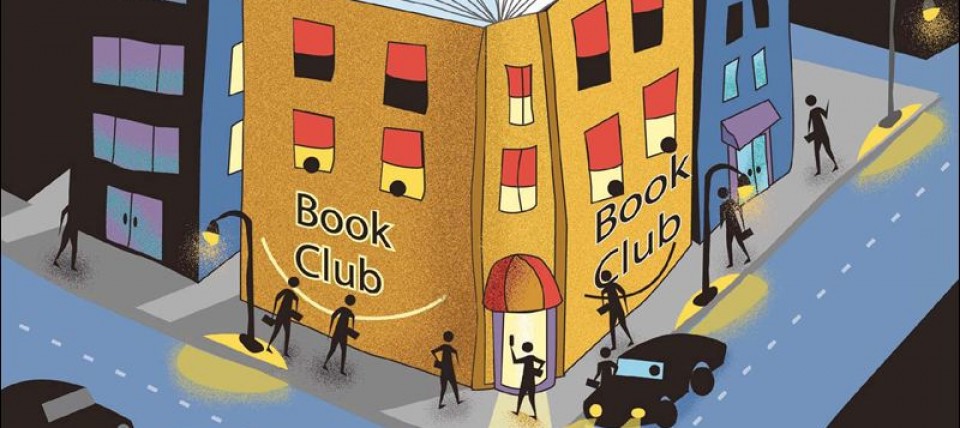

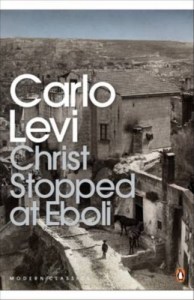 Just a short summing up of our meeting yesterday. We were a small group – a pity as Viccie gave us a very interesting overview of the Italian unification and Carlo Levi’s family history, which placed the book into its historical context. Though some of us didn’t find it a page-turner we all agreed the book was sort of universal concerning the problems it raised and very well written. The author’s position not of a judge but of a compassionate observer added to its literary and humanistic qualities.
Just a short summing up of our meeting yesterday. We were a small group – a pity as Viccie gave us a very interesting overview of the Italian unification and Carlo Levi’s family history, which placed the book into its historical context. Though some of us didn’t find it a page-turner we all agreed the book was sort of universal concerning the problems it raised and very well written. The author’s position not of a judge but of a compassionate observer added to its literary and humanistic qualities.